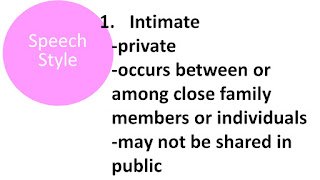Understanding varied speech situations is one of the prerequisites of learning the communicative competence strategies. These varied speech situations can be classified according to context, style, and intention of the utterances.
Speech Context
The environment, socio-economic conditions, atmosphere, and circumstances can be defined altogether as the context of communication. Speech Context is categorized into four. These are also known as levels or types of communication.
- Intrapersonal
“The message is made up of your thoughts and feelings. The channel is your brain, which processes what you are thinking and feeling. There is feedback in the sense that as you talk to yourself, you discard certain ideas and replace them with others.” (Hybels & Weaver, 2012, p 16)
This refers to communication that occurs within oneself. Talking to oneself often happens when making a decision, praying, reflecting, and writing diaries.
- Interpersonal
“The inter part of the word highlights how interpersonal communication connects people… when you engage in interpersonal communication, you and another person become linked together… The personal part means that your unique qualities as a person matter during interpersonal communication…” (Solomon & Theiss, 2013, p 5)
- Interpersonal can be classified into two:
- Dyad - occurs between two people.
- Small Group - involves a group engaging in face-to-face interaction for the purpose of achieving a common goal.
- Public Communication
“In public communication, unlike in interpersonal and small group, the channels are more exaggerated. The voice is louder and the gestures are more expansive because the audience is bigger. The speaker might use additional visual channels such as slides or a Power Point presentation.” (Hybels & Weaver, 2012, p 19)
Message is delivered before an audience and there is less to no chance of interaction in this type. In any types of public speech, the speaker is always responsible in preparing for the speech and in taking control during the actual delivery.
- Mass Communication
The message in this type is sent through particular media such as television, radio, internet, newspapers, magazines, and billboards. Speech Style
Every speeh context demands a different style of communication. Speech style mainly talks about the levels of formality in language use as described by Martin Joos (1961).
Intimate
Casual
This often occurs among friends, peers, and acquaintances. One may use colloquial expressions, informal language, slang, and vernacular.
Consultative
It is a standard form of communication that utilizes a professional tone and a mutually acceptable language. This type of communication often occurs between students and teachers, doctors and patients, among others.
Formal
This type uses a formal form of language and is usually delivered before an audience in a one-way channel.
Frozen
These refer to text that has remained "unchanged" which is often recited in ceremonies.
Speech Act Theory by John L. Austin (1968)
There are three types of acts in every utterance, given the right circumstances or context (Austin, 1962)
A speech act is an utterance that a speaker makes to achieve an intended effect.
Features of a Speech Act
- Locutionary – actual act /the actual utterance
- Illocutionary – social function / intention (maybe explicit or oml
- Perlocutionary – resulting act
Classifications of the Functions of Speech Acts
- Assertive
- Directive
- Commissive
- Expressive
- Declaration





















hello this is a good presentation. can you share with me this in a ppt Slide?pls?
ReplyDeleteIts good to know about your blog and you have done pretty impressive work on Classifications of Speech Situations post as i have read you post...keep doing well and keep updating with new post....coursework writing services | speech writing services
ReplyDeleteHelpful❤️❤️
ReplyDelete